Review of Pergolesi: Lo frate `nnamorato (Muti)
Introduction
This is a musical comedy about a tangle of three arranged marriages between a Roman and a Neapolitan family, which all the girls resist as all three girls are in love with the same young man. This is the second opera of composer Pergolesi and this production was recorded live in 1989 at Teatro alla Scala, Milan.
If you want a more detailed and lengthy breakdown of the acts, read on, else skip ahead to the next section. Warning, these do contain spoilers!
• Act I
Spending their summer holidays on Capodimonte Hill are two families: that of the old Neapolitan, Marcaniello, and that of the Roman bourgeouis, Don Carlo. The two have agreed, against the will of the ladies concerned, to a series of arranged marriages. Marcaniello longs to marry Nina (Carlo`s niece) and to assign her sister, Nena, to his son, Don Pietro. In exchange Don Carlo wishes to marry Marcaniello`s daughter, Luggrezia.
As the curtain rises, Vannella, Carlo`s maid, and Cardella, Marcaniello`s maid, are chatting as they go about their tasks in preparation for the imminent wedding. They are curious to make the acquaintance of Marcaniello`s son, Don Pietro, who has just returned from Rome, where he had been sent to study. Don Pietro appears, at once revealing his paradoxical character, introducing himself by dancing a minuet. Admiring himself in the mirror and speaking in a strange tongue, he brazenly courts the two young servant girls. Enter Don Carlo, an inordinately ceremonious figure in the old-fashioned Spanish manner, who discusses the forthcoming marriages with Don Pietro. Cardella entreats the two men not to think only of themselves, but to remember that she too would like to get married, and immediately, to boot.
The maids announce that neither Nena nor Luggrezia wishes to see her betrothed. Don Pietro leaves in a sulk while Don Carlo reminds his nieces that any attempt to shirk their marriages will be to no avail. Nena and Nina meditate on their plight. Having lost their father, they are now under the cruel authority of their uncle, Don Carlo; they are also without their brother, of whom they have heard nothing since he was taken away from them at a very early age. Moreover, it emerges that they are rivals in love.
If their situation is not a happy one, Luggrezia`s is no better. She refuses to marry Don Carlo and says so, clearly, to her father, Marcaniello, who flies into a rage, because her refusal means that he can no longer marry his beloved Nina. Luggrezia`s resistance is caused by her love for Ascanio, whose lack of interest causes her great suffering. But Ascanio defends himself; as the adopted son of Marcaniello, he regards Luggrezia almost as a sister, though he does love her. The impossibility of resolving the situation perturbs him deeply.
Not in the least touched by all this, the ineffable Don Pietro pretends to be madly in love with Vannella, who, acting the part of the coy maiden, encourages him. While they are flirting they are surprised by Marcaniello and, worse, by Nena, who cannot believe her luck in stumbling on this pretext for a row and a breach. She scolds Vannella, who defends herself by protesting innocence, and rudely dismisses Don Pietro. But the Don chuckles with delight, convinced that both Nena and Nina are secretly in love with him, Marcaniello, ill-treated by Nena, almost believes him and, further exasperated by the pain caused by his gout, makes a terrible scene.
• Act II
Luggrezia complains disconsolately of her love-sickness. Cardella concludes that she has rejected Don Carlo because she is in love with another. Marcaniello is troubled about the impending marriages, and goes off to Carlo`s house. He encounters Vannella who remarks on his ripe years and his gout. Nina wants it to be believed that she is jealous of Vannella and brusquely dismisses the astounded Marcaniello, who in vain protests his love. Impressed by Nina`s ability to get rid of the unwelcome lover, Vannella ponders on the willingness of women.
Don Pietro arrives and begs Ascanio to intercede on his behalf with Nena. Nena and Ascanio talk to each other in secret but their conversation takes quite a different turn: Nena confesses her love for Ascanio and chases off her astonished suitor. Ascanio, called to account by Don Pietro, conveys his embarrassment and despair. We understand that both Nena and Nina love him and that he himself is dying of passion not only for both of them but for Luggrezia as well. Nena and Nina confront Ascanio: let him make up his mind once and for all and choose one or the other of them. But Ascanio protests his good faith; he loves them both. How could he choose one when renouncing the other? Luggrezia, hearing all, dismisses Ascanio and shuts herself in her house.
Don Carlo, who expresses his uneasiness about the future of his relations with the recalcitrant Luggrezia, joins the scene. Next comes Cardella who has sadistically smudged Don Pietro`s face with rouge and is overjoyed at the paradoxical sight. After her comes the foaming and viperous Vannella and lastly poor Marcaniello who, in pain from his gout, vents his anger on his dissolute son and on his stepson Ascanio. The act concludes with a boisterous finale in which, amid the buffoonery and gibes of the servant girls, the defeat of the three suitors goes on record.
• Act III
In a great bravura aria, with flauto obbligato accompaniment, Nena sings of her pangs of love. She is echoed by Ascanio, who is incapable of governing or understanding his passion for three women at once.
Marcaniello and Don Pietro arrive to witness, with dismay, a furious argument between Vannella and Cardella, who hurl a range of colourful insults at one another, almost coming to blows. As Cardella goes off in a huff, Don Pietro, the impenitent philanderer, consoles himself with Vannella. In a hilarious duet he attempts to teach her, though she clearly already knows more than enough on the subject, how to make love: that is to say, in the matter of arcadian society, how a man`s passion for a woman should be expressed.
But the now ungovernable storm of sentiments is rising to a dramatic pitch. Ascanio, provoked into fighting a duel, is wounded. While treating the young man`s arm, Don Carlo notices a distinguishing mark, which enables him to recognise him as his brother`s son. Found and adopted by Marcaniello after being kidnapped by brigands and abandoned in the countryside as a child, Ascanio turns out to be none other than the long-lost brother of Nena and Nina, which explains his fond affection for them. Ascanio is now free to marry Luggrezia, and Don Pietro, Marcaniello and Don Carlo wisely abandon their matrimonial plans and join in the finale.
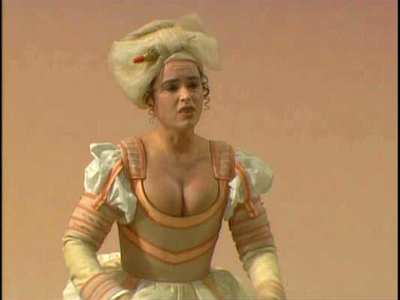
Video
Presented with a 4:3 fullframe transfer, Lo frate `nnamorato looks good. It`s a region 0 NTSC DVD, so I was surprised by the quality when I discovered it wasn`t a PAL disc. Colours are well rendered and detail comes through well. Look closer however and you`ll notice the grain, which thankfully isn`t intrusive. I couldn`t spot any other discernible problems with the transfer. If this opera was filmed in widescreen it would have made a difference and opened up the stage a little more.
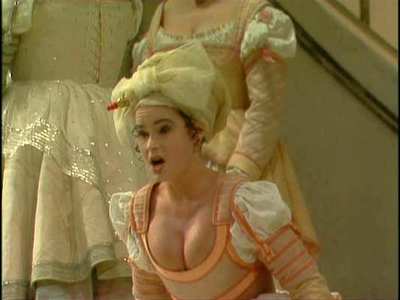
Audio
There`s just one soundtrack, Dolby Digital 2.0 Italian and it sounds good. The sound is clear and dynamic without sounding flat and serves the opera well.
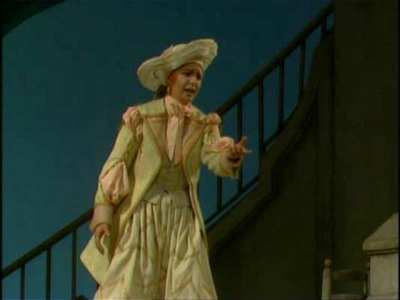
Features
With the DVD is an enclosed 30-page booklet containing the libretto. There are no extras on the disc however. Lo frate `nnamorato comes with clear English subtitles.
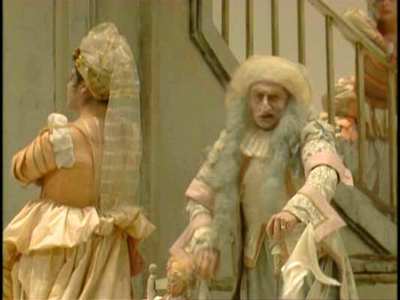
Conclusion
Not having seen this opera before, I have to say that I was impressed. The music flows beautifully and the singers sing very well. The production design and staging are very good and definitely gives the impression of an intimate stage and I could imagine almost being there. The costumes, lighting and the quality of the production shone through too. As with most operas, the storytelling, through the singing, takes its time to get us through from start to finish via the three acts. It`s easy to become impatient at times and skip ahead, but this is one of those occasions where Pergolesi`s beautiful score encourages one to drift off to someplace else and just go with the flow; usually to sleep, but in a good way. Lo frate `nnamorato proves entertaining, so if you`re in the mood for a light comedy opera, it`s well worth checking out.
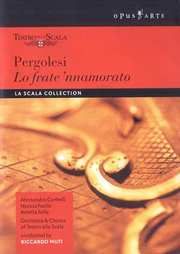
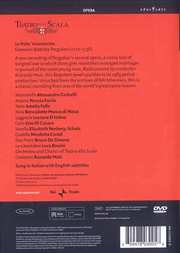




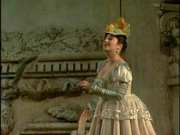
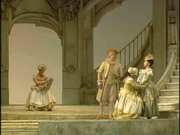
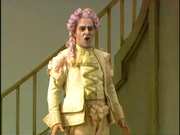
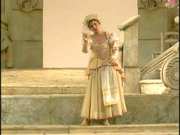
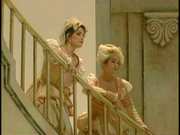
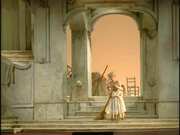
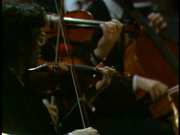
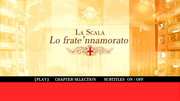






























Your Opinions and Comments
Be the first to post a comment!